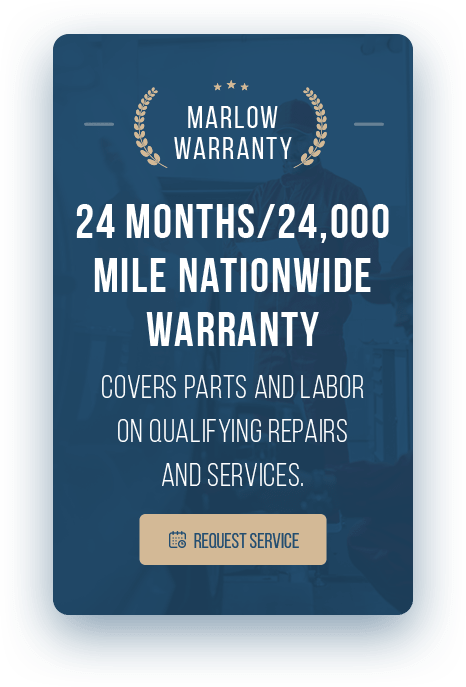Your vehicle’s braking system is unquestionably one of the most critical components contributing to your safety on the road. Proper brake maintenance and timely repairs are essential for ensuring peak performance and preventing accidents caused by a compromised braking system. With advances in automotive technology, brake systems have become increasingly sophisticated, requiring specialized knowledge and expertise to maintain their efficacy effectively.
A properly functioning braking system requires the harmonious collaboration of numerous components, including brake pads, brake shoes, brake rotors, and a host of hydraulic and electronic elements. Regular brake service, conducted by Marlow Automotive can prolong the life of these components and ensure the optimal performance of your braking system. Continue reading as we break down the primary aspects of brake service, offering practical tips and invaluable insights into proper care and maintenance techniques to maximize safety and performance.
The Importance of Regular Brake Service and Maintenance
Regular brake service is non-negotiable for maintaining your vehicle’s safe and efficient operation. It comes with several benefits:
1. Enhanced Safety: Timely brake maintenance helps to prevent brake-related accidents, ensuring the safety of drivers, passengers, and pedestrians.
2. Prolonged Component Life: Properly maintained brake components wear down more slowly, reducing the frequency of costly repairs or replacements.
3. Improved Performance: A well-maintained brake system provides a more responsive, efficient, and reliable braking experience.
4. Increased Resale Value: A vehicle with a well-documented history of brake maintenance and service is often more attractive to potential buyers.
Understanding Brake Pads: Replacement Tips and Symptoms of Wear
Brake pads are an essential component of your braking system, responsible for applying friction to slow your vehicle. Knowing when to replace them and recognizing the signs of wear is crucial:
1. Thickness: Inspect the thickness of your brake pads regularly. If they are less than ¼ inch thick, it’s time for a replacement.
2. Warning Light: Many modern vehicles have brake pad sensors that trigger a warning light on the dashboard when replacement is required.
3. Squeaking or Squealing Sounds: Unusual noises from your brakes may indicate worn brake pads in need of replacement.
4. Reduced Braking Performance: If your car takes longer than usual to stop or the brake pedal feels spongy, consider a brake pad replacement.
Brake Shoe Care: Getting to Know the Drum Brake System
Brake shoes are part of the drum brake system and work in conjunction with brake drums to slow your vehicle. Understanding their function and care is essential for optimal brake performance:
1. Inspection: Like brake pads, brake shoes should be inspected regularly for wear. If they’re less than 1/16 inch thick, a replacement should be scheduled.
2. Noise: Grinding or squeaking sounds from your drum brakes may indicate worn or damaged brake shoes.
3. Responsiveness: If your brake pedal feels soft or requires excessive force to engage, it might be time to have your brake shoes checked.
4. Maintenance: Regular cleaning and adjustment of drum brakes can help maximize the lifespan of brake shoes and improve overall brake system performance.
Comprehensive Brake Inspection: What to Expect and Why It's Necessary
A comprehensive brake inspection should be part of your routine vehicle maintenance plan to ensure the optimal function of your braking system:
1. Frequency: Schedule a brake inspection with our qualified technician at least once per year or more often if you notice any unusual symptoms.
2. Components: During a comprehensive brake inspection, our technician should examine the brake pad and shoe thickness, rotor and drum condition, hydraulic components, and brake fluid.
3. Diagnostics: Utilizing advanced diagnostic tools and equipment, our technician can precisely assess your brake system’s health and recommend repairs or maintenance as needed.
4. Customized Solutions: Our skilled technician will offer tailored guidance and solutions for your specific vehicle’s brake concerns, ensuring the best possible outcome.
The Ins and Outs of Brake Rotors: Maintenance and Replacement Recommendations
Brake rotors – also known as brake discs – play a key role in your vehicle’s stopping power. Recognize the signs of wear and follow these tips to maintain their effectiveness:
1. Warped Rotors: Pulsation or vibration in your brakes may suggest warping in the rotors, requiring resurfacing or replacement.
2. Grooves or Scoring: Visibly damaged or grooved rotors can compromise your braking system’s performance, necessitating rotor replacement.
3. Rust or Corrosion: Untreated rust on your rotors can lead to reduced braking efficiency and eventual rotor failure.
4. Mileage: Consult your vehicle’s owner’s manual for manufacturer-recommended rotor replacement intervals, typically every 30,000 to 70,000 miles.
Stay Safe and Confident on the Road with Expert Brake Service
Understanding the essentials of brake service and maintenance, including brake pad and shoe replacement, comprehensive brake inspection, and rotor care, is crucial for ensuring the safety and performance of your vehicle. Entrusting your vehicle’s brake service in Plano to our skilled technicians at Marlow Automotive guarantees quality workmanship and tailored solutions designed to address the unique needs of your braking system. Schedule an appointment with us today, and drive with the confidence that comes from knowing your brakes are always primed for peak performance.


